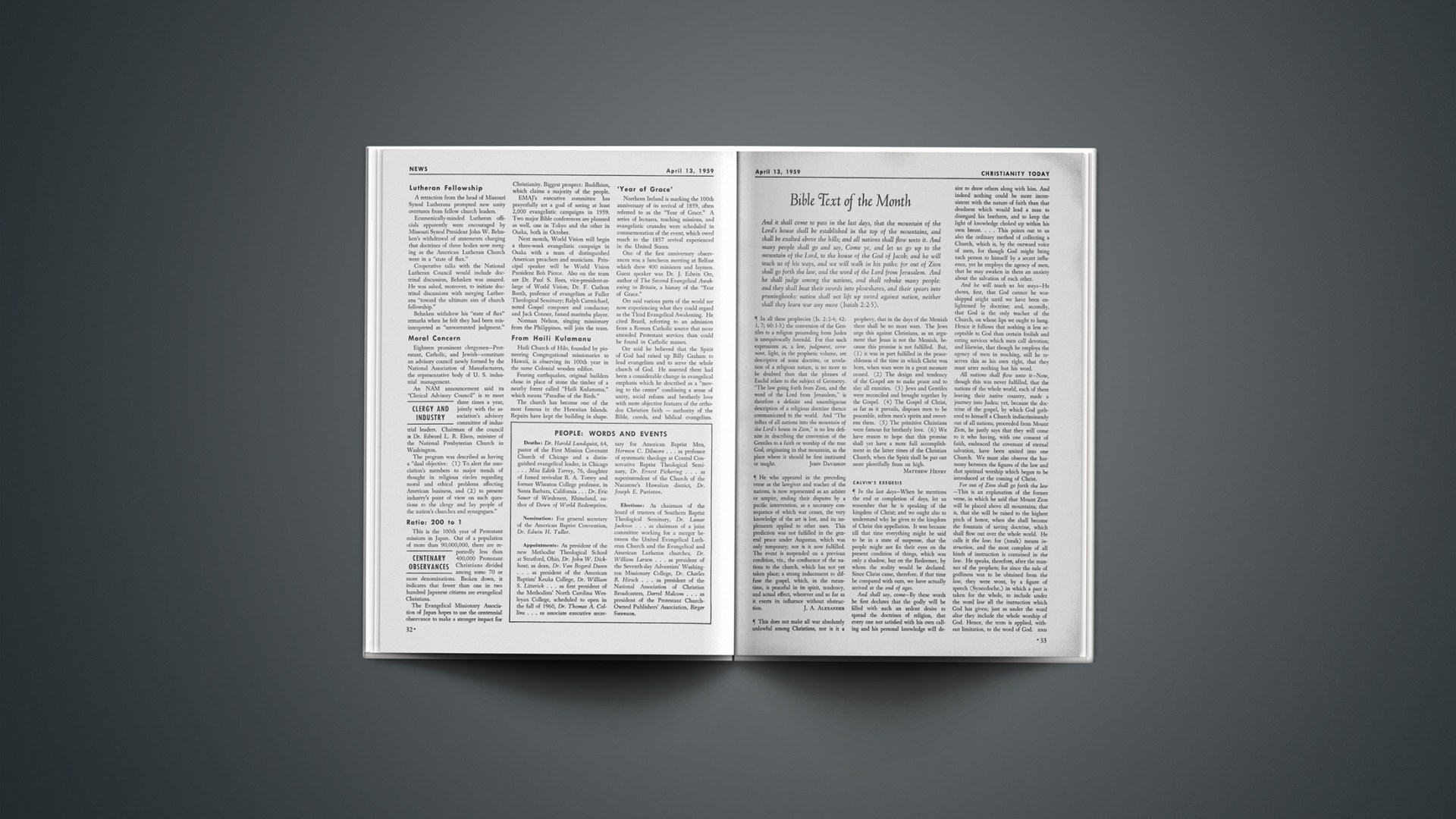And it shall come to pass in the last days, that the mountain of the Lord’s house shall be established in the top of the mountains, and shall be exalted above the hills; and all nations shall flow unto it. And many people shall go and say, Come ye, and let us go up to the mountain of the Lord, to the house of the God of Jacob; and he will teach us of his ways, and we will walk in his paths: for out of Zion shall go forth the law, and the word of the Lord from Jerusalem. And he shall judge among the nations, and shall rebuke many people: and they shall heat their swords into plowshares, and their spears into pruninghooks: nation shall not lift up sword against nation, neither shall they learn war any more (Isaiah 2:2–5).
In all these prophecies (Is. 2:2–4; 42:1, 7; 60:1–3) the conversion of the Gentiles to a religion proceeding from Judea is unequivocally foretold. For that such expressions as, a law, judgment, covenant, light, in the prophetic volume, are descriptive of some doctrine, or revelation of a religious nature, is no more to be doubted than that the phrases of Euclid relate to the subject of Geometry. “The law going forth from Zion, and the word of the Lord from Jerusalem,” is therefore a definite and unambiguous description of a religious doctrine thence communicated to the world. And “The influx of all nations into the mountain of the Lord’s house in Zion,” is no less definite in describing the conversion of the Gentiles to a faith or worship of the true God, originating in that mountain, as the place where it should be first instituted or taught.
He who appeared in the preceding verse as the lawgiver and teacher of the nations, is now represented as an arbiter or umpire, ending their disputes by a pacific intervention, as a necessary consequence of which war ceases, the very knowledge of the art is lost, and its implements applied to other uses. This prediction was not fulfilled in the general peace under Augustus, which was only temporary; nor is it now fulfilled. The event is suspended on a previous condition, viz., the confluence of the nations to the church, which has not yet taken place; a strong inducement to diffuse the gospel, which, in the meantime, is peaceful in its spirit, tendency, and actual effect, wherever and so far as it exerts its influence without obstruction.
This does not make all war absolutely unlawful among Christians, nor is it a prophecy, that in the days of the Messiah there shall be no more wars. The Jews urge this against Christians, as an argument that Jesus is not the Messiah, because this promise is not fulfilled. But, (1) it was in part fulfilled in the peaceableness of the time in which Christ was born, when wars were in a great measure ceased. (2) The design and tendency of the Gospel are to make peace and to slay all enmities. (3) Jews and Gentiles were reconciled and brought together by the Gospel. (4) The Gospel of Christ, as far as it prevails, disposes men to be peaceable, soften men’s spirits and sweetens them. (5) The primitive Christians were famous for brotherly love. (6) We have reason to hope that this promise shall yet have a more full accomplishment in the latter times of the Christian Church, when the Spirit shall be put out more plentifully from on high.
Calvin’S Exegesis
In the last days—When he mentions the end or completion of days, let us remember that he is speaking of the kingdom of Christ; and we ought also to understand why he gives to the kingdom of Christ this appellation. It was because till that time everything might be said to be in a state of suspense, that the people might not fix their eyes on the present condition of things, which was only a shadow, but on the Redeemer, by whom the reality would be declared. Since Christ came, therefore, if that time be compared with ours, we have actually arrived at the end of ages.
And shall say, come—By these words he first declares that the godly will be filled with such an ardent desire to spread the doctrines of religion, that every one not satisfied with his own calling and his personal knowledge will desire to draw others along with him. And indeed nothing could be more inconsistent with the nature of faith than that deadness which would lead a man to disregard his brethren, and to keep the light of knowledge choked up within his own breast.… This points out to us also the ordinary method of collecting a Church, which is, by the outward voice of men, for though God might bring each person to himself by a secret influence, yet he employs the agency of men, that he may awaken in them an anxiety about the salvation of each other.
And he will teach us his ways—He shows, first, that God cannot be worshipped aright until we have been enlightened by doctrine; and, secondly, that God is the only teacher of the Church, on whose lips we ought to hang. Hence it follows that nothing is less acceptable to God than certain foolish and erring services which men call devotion; and likewise, that though he employs the agency of men in teaching, still he reserves this as his own right, that they must utter nothing but his word.
All nations shall flow unto it—Now, though this was never fulfilled, that the nations of the whole world, each of them leaving their native country, made a journey into Judea; yet, because the doctrine of the gospel, by which God gathered to himself a Church indiscriminately out of all nations, proceeded from Mount Zion, he justly says that they will come to it who having, with one consent of faith, embraced the covenant of eternal salvation, have been united into one Church. We must also observe the harmony between the figures of the law and that spiritual worship which began to be introduced at the coming of Christ.
For out of Zion shall go forth the law—This is an explanation of the former verse, in which he said that Mount Zion will be placed above all mountains; that is, that she will be raised to the highest pitch of honor, when she shall become the fountain of saving doctrine, which shall flow out over the whole world. He calls it the law; for (torah) means instruction, and the most complete of all kinds of instruction is contained in the law. He speaks, therefore, after the manner of the prophets; for since the rule of godliness was to be obtained from the law, they were wont, by a figure of speech (Synecdoche,) in which a part is taken for the whole, to include under the word law all the instruction which God has given; just as under the word altar they include the whole worship of God. Hence, the term is applied, without limitation, to the word of God.
END










